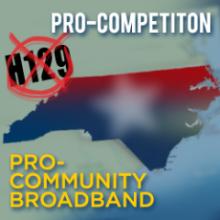
Fast, affordable Internet access for all.

February 25, 2011
via email
Representative Thom Tillis
Speaker of the House
Room 2304
16 West Jones Street
Raleigh, NC 27601-1096
Senator Phil Berger
Senate President Pro Tempore
Room 2008
16 W. Jones Street Raleigh, NC 27601-2808
Dear Representative Tillis and Senator Berger:
We, the undersigned private-sector companies and trade associations, urge you to oppose H129/S87 (Level Playing Field/Local Competition bill) because it will harm both the public and private sectors, stifle economic growth, prevent the creation or retention of thousands of jobs, hamper work force development and diminish the quality of life in North Carolina. In particular, this bill will hurt the private sector in several ways: by curtailing public-private partnerships, stifling private companies that sell equipment and services to public broadband providers, and impairing educational and occupational opportunities that contribute to a skilled workforce from which businesses across the state will benefit.
The United States continues to suffer through one of the most serious economic crises in decades. The private sector alone cannot lift the United States out of this crisis. As a result, federal and state efforts are taking place across the Nation to deploy both private and public broadband infrastructure to stimulate and support economic development and jobs, especially in economically distressed areas. North Carolina has been the beneficiary of these efforts, as MCNC, with its $148 million award, is now building a state-of-the-art fiber optic network that will cross 106 counties and make available low-cost, internet connections to numerous high-cost, low-density, communities that the state’s private providers have chosen not to serve. H129/S87, with its burdensome financial and regulatory requirements, will prevent public broadband providers from building the sorely needed advanced broadband infrastructure that will stimulate local businesses development, work force retraining and employment in these economically depressed areas.
Consistent with these expressions of national unity, public entities across America, including North Carolina, are doing their share to bring affordable high-capacity broadband connectivity to all Americans. Enactment of direct or effective barriers to municipal broadband such as H129/S87 would be counterproductive to the achievement of these goals. It would also be inconsistent with our country’s National Broadband Plan, which recommends that no new barriers be enacted and that existing barriers be removed.
We support strong, fair and open competition to ensure that users can enjoy the widest range of choices and opportunities. H129/S87 is a step in the wrong direction. North Carolina should be removing barriers to public broadband initiatives rather than establishing new ones, so that high technology companies can spread and prosper into all the communities in this beautiful state. Please oppose H129 and S87, and any other measures that may emerge that would significantly impair municipal broadband deployments or public-private partnerships in North Carolina.
